As I wrap up the weekend, I reflect on the visit I had with a friend from high school. Tim and his lovely wife Lynn came north to see the fall colors and part of their adventure was to spend a night at our farm.
On Friday I took them through our alpaca paddocks and introduced them to my quirky herd of alpacas. Both Tim and Lynn would laugh at the tidbits I would share, the alpacas and their behavior, and the fact that they are like no other animal.
We headed to dinner that night and conversation continued around the alpacas and our journey into farming. The more we talked, the more I realized my beloved alpacas are truly the quirkiest animals I’ve ever met.
Our blog receives visitors from all over the world and I often receive comments or inquiries from people asking what’s it like to raise them. I thought I would document the most common nuances I tend to share with people when they visit our farm and ask about these goofy creatures.
When you read my list, you’ll see why alpacas are unique, interesting, and truly like no other animal.
Alpacas Can Be Introverted and Extroverted
Just like their human counterparts, alpacas can be an introvert or an extrovert. In fact, I tend to find it rare that someone is middle of the road.
As soon as I head towards the paddock my favorite girls will run my way to investigate, say hello, and get some love. Nibbler, Sherry Ann, and Jalapena are core members of my posse, and they all want and need attention. If I stay in the paddock, all three girls stay with me. If someone is with me, the three girls require the visitors to interact with them as well. Amara, Kolette, and Monica Ann will also be eager to come over, but those girls are a quick hello or kiss, and then they go back to their business. Those ladies are all our extroverts.
Amber Fantasy, Faith, Onyx, Daisy, and Peruvian Amber are all introverts. They are sweet, but they don’t crave attention like the others and they don’t need to be the center of attention.
Vicki Grey Butt is the anomaly. She is an introvert who longs to be an extrovert. She tries to be in the mix of my posse and really wants to be part of it, but her quiet personality is overshadowed by the extroverted alpacas. I didn’t catch this at first and I feel bad it took me months to realize what was happening. But now I know and I’ve adapted my behaviour to accommodate Vicki’s emotional needs. I made sure she was part of things, I gave her personalized attention, but I also shielded her from the extroverts that overpowered her.
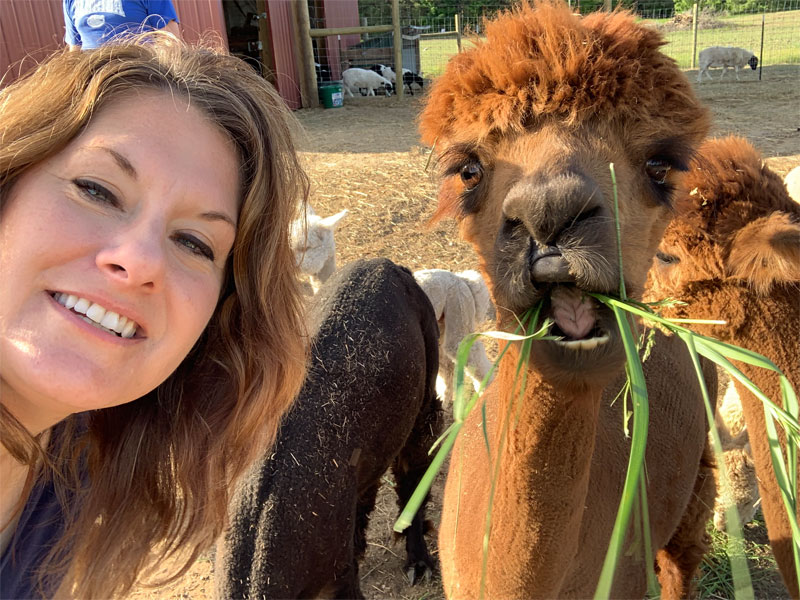
Alpacas Can Have Best Friends
When we first started breeding alpacas we had two babies called Chase and Sherry Ann. Chase is white and Sherry Ann is white with large fawn spots. Alpacas tend to hang out with their own color, which is one of the reasons Chase and Sherry Ann were so close as babies. When six months arrived, it was time to ween the babies and we had to remove Chase from the girl’s pen. Sherry Ann was so upset that her best friend was removed it broke my heart. She showed visual stress immediately and then she laid at the fence line looking for Chase for days. She eventually replaced Chase with Lilly Grace, but it wasn’t quick, and they never had that inseparable relationship she had with Chase.
In this year’s babies, we see the same situation in Ryan and Auburn. They were our last two babies to arrive, and they are about the same size. They follow each other around and they are always together. I dread the day when it is time to ween and we have to remove Ryan from Auburn.
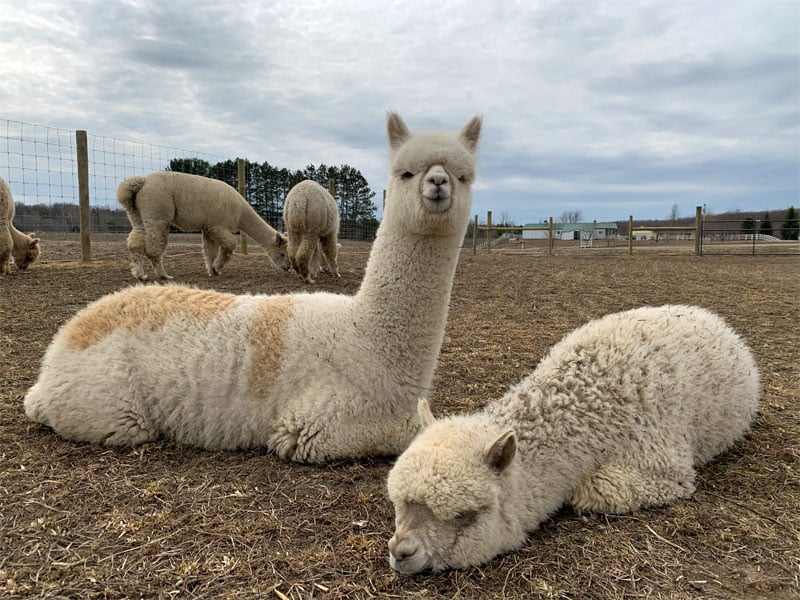
Alpacas Can Have Mortal Enemies
Nibbler and Amara are half-sisters. They share the same mother and have similar personalities. I should also note that they have very strong personalities. They truly hate each other and we can hear Amara squealing in the house with anger over something her sister did. In Nibbler’s defense, little sister Amara is usually to blame. I keep thinking this will calm down, but it doesn’t. I think their strong personalities just collide and they rub each other the wrong way.
These two girls are not the only instance of alpacas having enemies. No matter how many alpacas we have, there are always two that don’t get along.
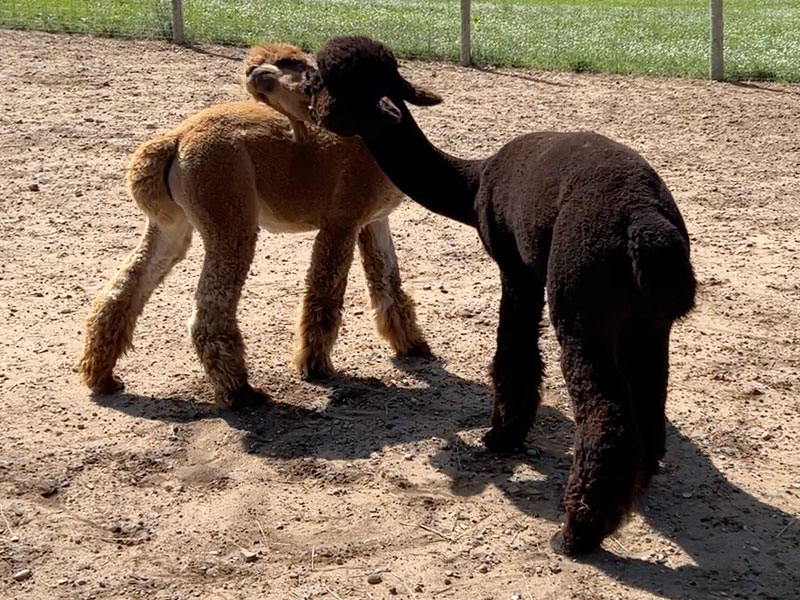
Alpacas Can Die of Loneliness
Alpacas are herd animals and need at least three alpacas to feel safe. Some alpacas need even larger groups to be mentally healthy. Part of this herd mentality is protection and part of it is companionship.
When an alpaca is alone it gets stressed, and when it gets stressed, it gets physically sick. This sickness can be so severe it ends up with a terminal illness and eventually dies.
Over the years we’ve had many calls from people who lost an alpaca and needed to locate one quickly because the remaining one is failing from loneliness. Find a new alpaca for the lone survivor and their health rebounds quickly.
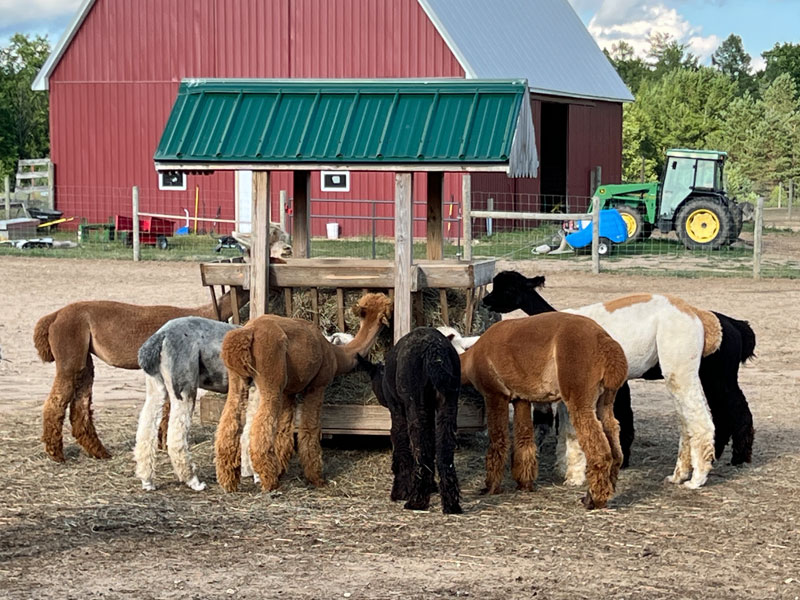
Alpacas Can Be Uncoordinated, Clumsy, and Messy
Alpacas generally do not move with grace. They are clumsy and uncoordinated just like me. I think this might be one of the reasons I love them so much. They make me look normal. When the adults run, they tend to have legs flying in every direction. When the babies run, their back legs get ahead of their front legs, or they start to run forward only to find themselves going sideways. It’s a hot mess and super funny to watch.
And for as much as alpacas can be clean animals, they love their hay and naps in the sun. This means they get super messy and so does their fiber.
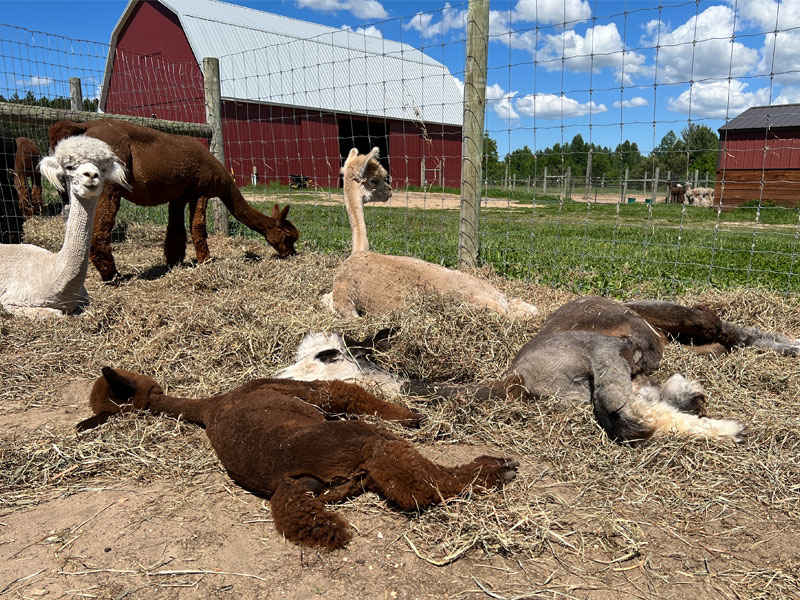
Alpaca Can Have No Sense of Personal Space
In addition to not understanding they are large animals, our alpaca herd has no sense of personal space. They’ll run into you without trying to or they’ll crowd around wanting attention and annoy each other because they are all much too big for the space allowed. They’ll get right up in your face, again not realizing their size and that you might want a few inches to breathe fresh hair. With our herd, you don’t get fresh air. Instead, you get hay breath from their exhale. And this silliness doesn’t stay in the paddock. When I come in the house my hair smells like alpaca because they’ve all been so close to me that my hair has sucked up the smell of their fiber. Thank heavens they don’t smell like most livestock.
Have I oversocialized them as babies and caused this issue? No, not at all. It happens with alpacas that were purchased as adults, which means I could not have imprinted on them as babies. What I did do was build their trust and allow them to feel safe when close to me. This safety tears down their walls of protection which helps them forget they are livestock.
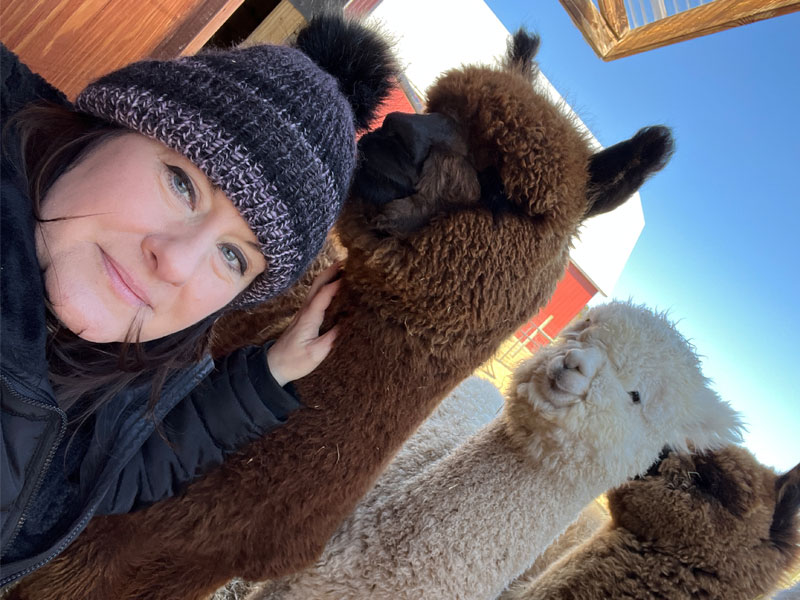
Alpacas Can Have Great Memories
A few years ago our insurance agent introduced us to a window who needed to disperse her herd. We helped rehome all the alpacas besides 18-year-old Amber. We knew no one would willingly take an alpaca that old (they only live to about 20), so we kept her and promised the owner we would love her, care for her, and let her live her remaining years out at our farm. And Amber has done just that. She is the queen of the ladies’ barn.
One day Amber’s original owner arrived at our farm. Mary Jane was the owner of Big Willows Alpacas in a town south of us. My husband knew exactly who she was and was excited to meet her. After all, Mary Jane’s farm was “the alpaca farm” in Northern Michigan years and years ago. Jason told Mary Jane that he thought we had one of her original alpacas and she quickly asked to see Amber.
As Mary Jane walked into the barn she called for Amber and Amber jumped up and ran right over to her. Mary Jane had not owed Amber for many, many years, and yet, Amber knew her and was eager to go see her.
My husband said he was amazed at the connection and the memory our grannie alpaca had. I viewed it as love, respect, and appreciation. And it shows alpacas have an amazing memory.
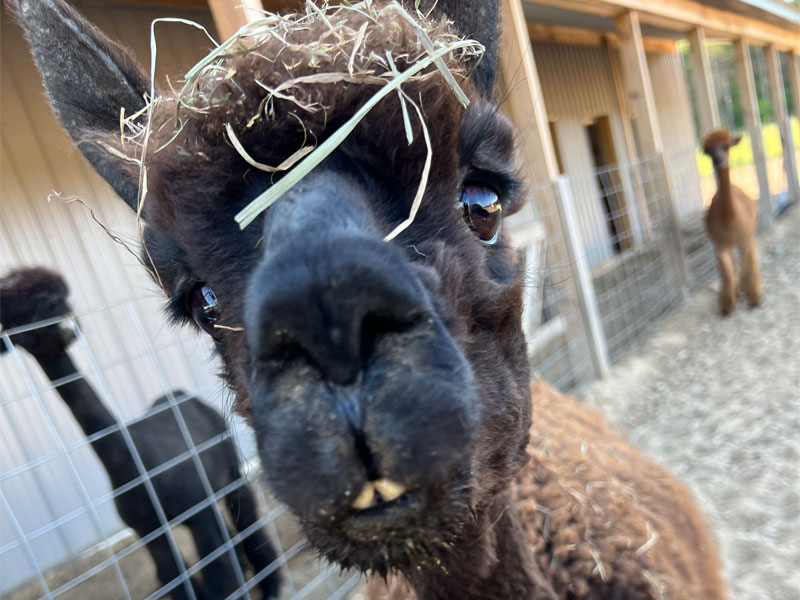
Alpacas Can Maintain a Serious Bond With Their Favorite Humans
I have strong bonds with my alpacas and I take pride in this fact. But I’m not the only one.
We purchased Leviticus from our friends Kim and Nancy. We’ve had him for a few years now, and while I can tell Leviticus likes and respects me, I am no Nancy. There is no doubt his true love is for Nancy.
Nancy can show up at our farm and call Leviticus’s name from yards and yards away. That boy will perk up, look for her, and be super excited to see her. When she arrives and greets him you can see a true connection between them. This big old male will lay his head against her and snuggle in.
I will never have this connection with him. Nancy birthed and raised Leviticus and there is no way me or anyone else can replace her in his heart.
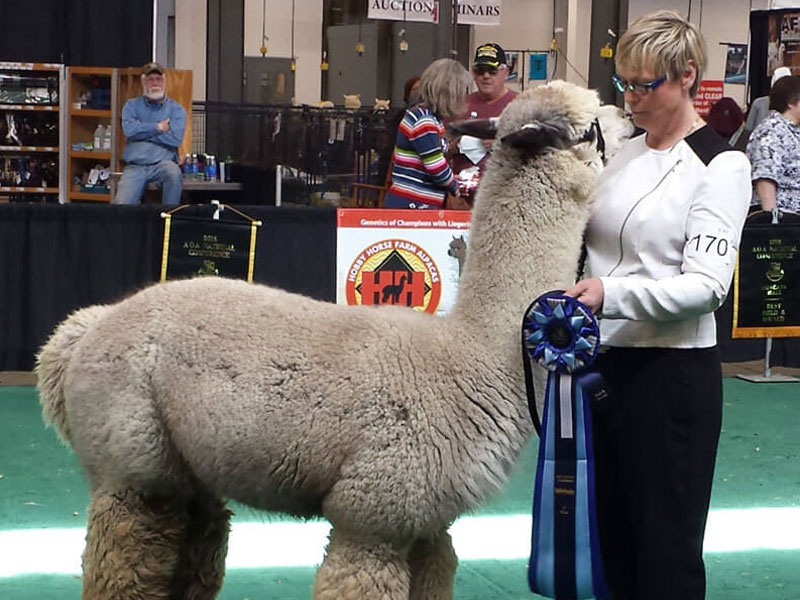
Alpacas Can Know How to Pose for Photos
On our farm a cell phone means treats. Or at least this is what our entire herd believes. Because we do interactive tours where visitors take photos and feed snacks, our herd now thinks iPhones and snacks go together.
The smart alpacas know how to stand still, look cute, and smile. They do this because they know as soon as that human captures the perfect photo with their smartphone, they’ll start to feed treats. Adel is the queen of this pose, and when she is not pregnant, she can pose perfectly with a group of kids for however long it takes to wrangle the group into position. Adel has the patience of a saint.
While I’d like to personally take credit for this trick, I cannot. My son Hunter and Adel bonded when she was young and he is 100% responsible for her behavior. And just like my story of Nancy and Leviticus or Mary Jane and Amber, Hunter and Adel will forever have a connection that surpasses the reward of food.
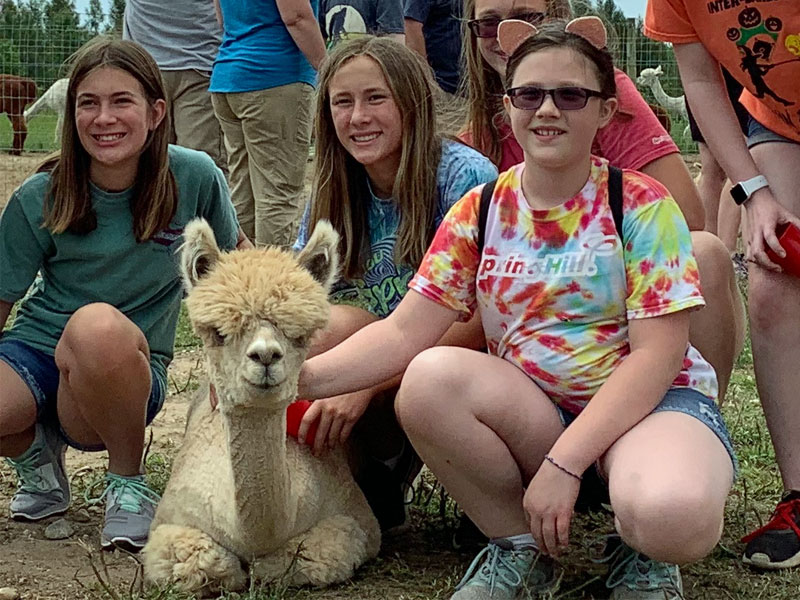
Alpacas Can Like Fancy Cocktails
When Chase was younger we used to take him as a paid guest to weddings. He is super social, so he liked the activity. One day we were at a wedding and the bride’s friends asked to include him in a photo. I agreed and I handed Chase over. The wedding photographer took time to get the perfect photo, and while he did, Chase decided he’d like to try a gin and tonic. He stuck his big alpaca nose right into one of the girl’s drinks and no one besides me even noticed. For the rest of the night, this silly alpaca tried to drink out of everyone’s cup. Apparently, he likes pretty ladies and cocktails.
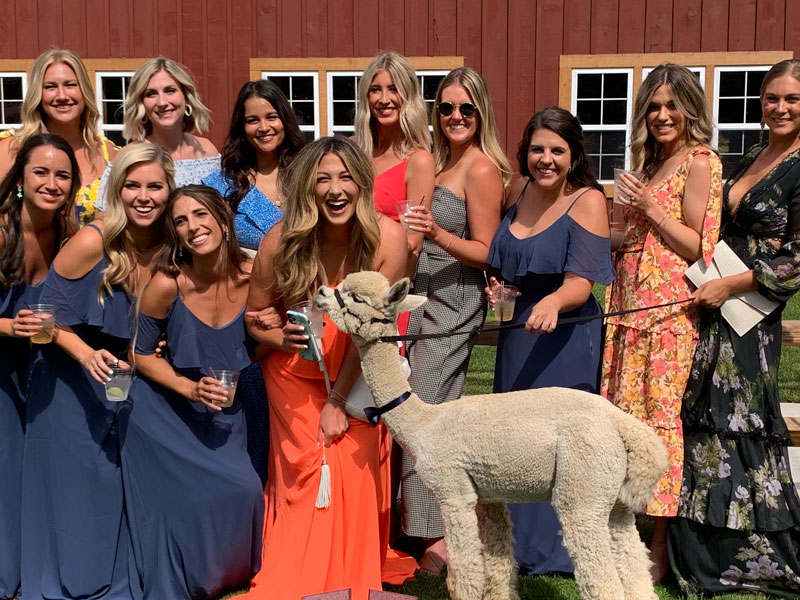
Alpacas Can Open Gates, Turn Off Fans, and Turn On Lights
Some alpacas are just troublemakers and some alpacas can be occasional troublemakers.
One day my husband and I were having coffee when one of us noticed chaos outside. The alpacas were all over and no one was in the right paddock area. Somehow everyone was loose and no one was claiming responsibility. Since we have a son who does chores we immediately assumed he forgot to close the gate. But that would have explained one gate being opened and not multiple gates opened. After we got everyone back to their right pens we turned on the camera replays to see what happened. To our surprise, little Nellie went around and opened every gate. At six months old she figured out how to open one gate, then used this knowledge to open all gates. Sweet little Nellie. We couldn’t believe it.
Nellie was just prepping us for Cammi, Petiti, Amara, and Luna. These ladies open gates, steal hats and bowls, turn fans on and off, and turn lights on and off. We had to put tape over cords and extra latches on gates to make it stop.
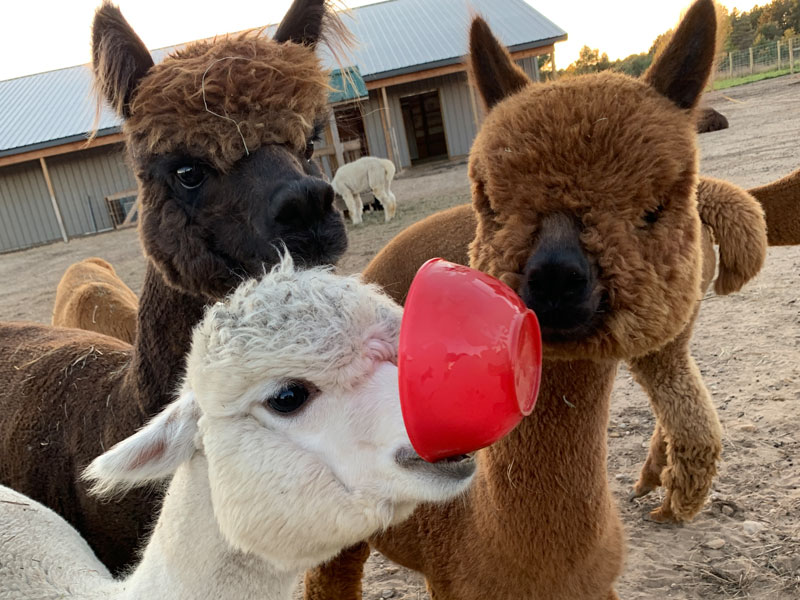
Alpacas Can Be Very Trainable
On our farm, I am the alpaca female and my herd of alpaca ladies know this. They have learned my “mom look”, they know a hand up means stop spitting, and they know a wagging finger and a loud “no ma’am” means stop whatever you’re doing because it is not ladylike behavior.
I didn’t realize I was training the alpacas and actively performing behavior modification. At the time I just knew I didn’t like drama and I wasn’t going to put up with it in my alpaca herd. Without realizing it, I was treating the girls like they were my kids. And my furry children were learning just like a toddler would.
The more I interact with the herd, the more I talk to them like they are human children, the better their behavior becomes, and the closer we all get as a human/alpaca family.
Our alpacas also go through 4-H training with our Farm and Fleece group and in a few short weeks you can see a huge transformation. The alpacas love their trainers, the kids love their alpacas, and both are performing well in performance classes and obstacle competitions. It’s really cool to watch.
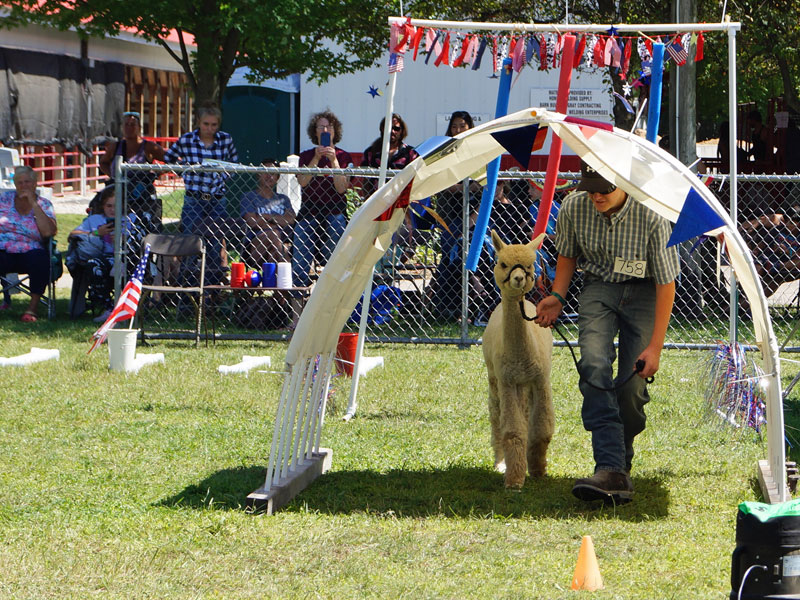
Alpacas Can Train Their Humans
When Amara was a cria it was winter and our alpaca store was open for shopping. We have a glass door at the back of the store that allows visitors to see into the ladies’ barn. This door also would allow the alpacas to see into the store. If Amara was bored, she would come to this door and start tapping on the digital keypad. We would let her in and she would spend 20 minutes hanging out with the shoppers.
The first time she did it we thought it was cute. When Amara taught her alpaca friend Molly about shopping, we thought she was even cuter. The fifth time requested shopping access, we realized she had trained us to do her bidding. Alpacas are crafty critters.
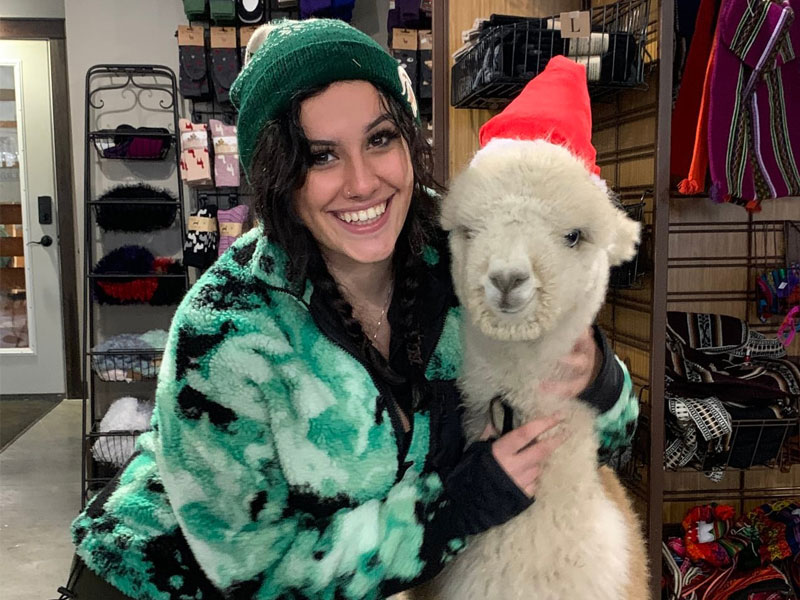
Alpacas Can Be Great Travelers
When Dolly was pregnant with Ollie she developed a jaw infection. We had it looked at by the vet, and after consulting with Ohio State University, we knew she needed surgery. OSU told us to wait until she delivered her baby and then bring her down right away. We worried about her baby and they told us to bring him along.
OSU is a fabulous hospital for alpacas so we didn’t even question their advice. When the day came to head to Ohio we were having excessive heat in the Midwest. We didn’t have air conditioning in the livestock trailer and there was no way Dolly and Ollie could last in 96-degree heat. Our only choice was to load both up and put them in the back of my SUV.
Dolly and Ollie did great! It was a seven-hour drive each way. We didn’t have any accidents (the potty kind) and when Ollie was hungry, we’d just pull over so Dolly could stand and feed him. While Dolly didn’t love the journey, the surgery saved her life, and she has gone on to have two more babies since.
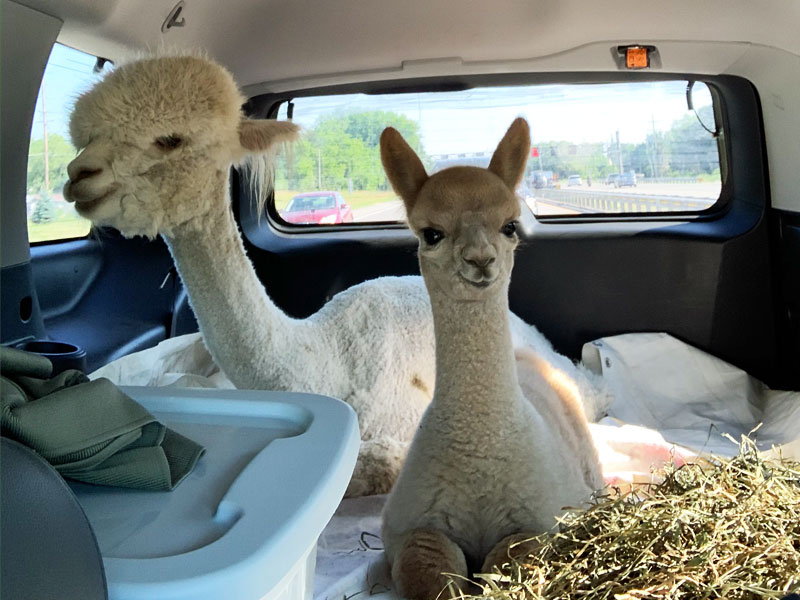
Alpacas Can Make Babies Without a Normal Cycle
Alpacas don’t have a traditional cycle for fertility. Instead, the ovulation process starts when the male is presented and the breeding begins. This means you can breed any time of the year. It also means you need to keep the boys well away from the girls or pandemonium takes place. Breeding always has an active audience and you can never have privacy when making a baby.
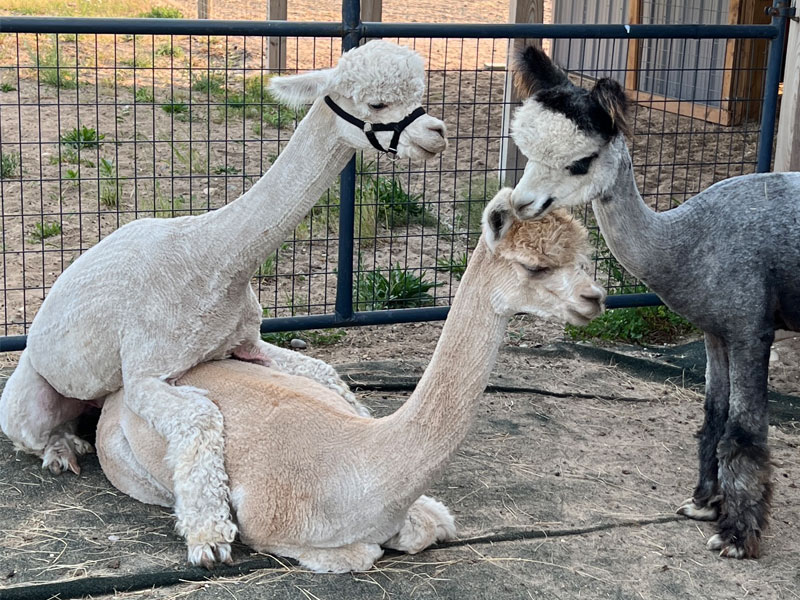
Alpaca Herds Can Have a Stud Muffin
In our herd, Leviticus is the resident stud muffin. The ladies love him and flock to him. We call him Fonzi because he reminds us of the Happy Days TV show scenes when “The Fonz” arrives at Arnold’s and all the girls run to him.
When it’s time to breed we put a halter on Leviticus and walk him towards the ladies. He knows his role and he plays the part to perfection. He pumps up his chest, prances, and starts to make an orgling sound. The ladies see this and swoon. They literally drop at his feet hoping they are the ones who get to breed.
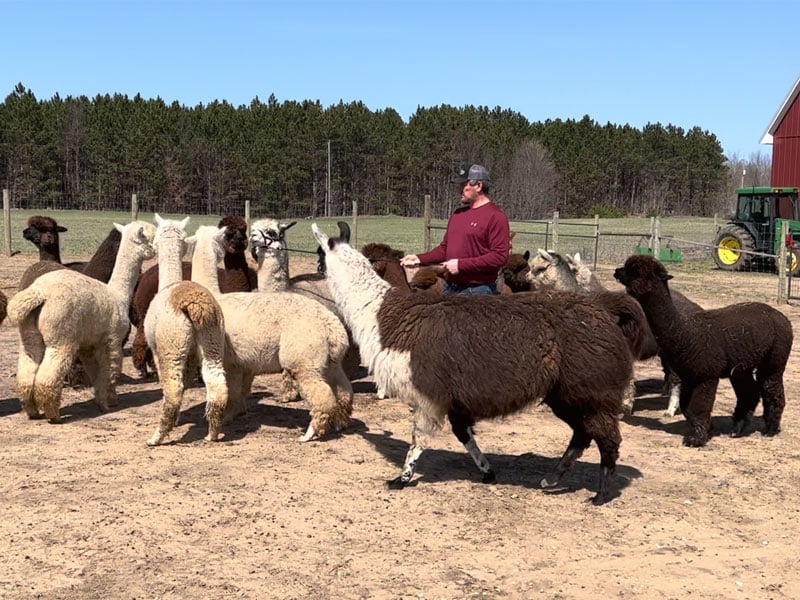
A Spit Check Can Signal a Positive Pregnancy
When an alpaca is pregnant she has an overwhelming need to protect her baby. It’s so strong the industry has what is called a “spit check” and this equates to bringing stud muffin Leviticus over to see the ladies. If a female alpaca runs up to him and spits in his face, she is pregnant. And if she drops to the ground, she is open and ready to breed. Believe it or not, this spit test is over 90% accurate. It’s quirky and crazy, but it works.
Alpacas Can Make Sure Babies Only Arrive in Daylight Hours
Unless there is a troubled birth, most alpacas deliver their babies in daylight hours. On our farm in Northern Michigan, this is usually between 10:00 a.m. and 4:00 p.m. Right after coffee and right before dinner is our window of opportunity.
Why might you ask? Well, the industry experts believe it is because alpacas originate in the Andes Mountains and the babies would need daylight to figure out their surroundings before night falls on the mountains. The alpacas have evolved to give their babies the best chance of survival.
Nature is cool.
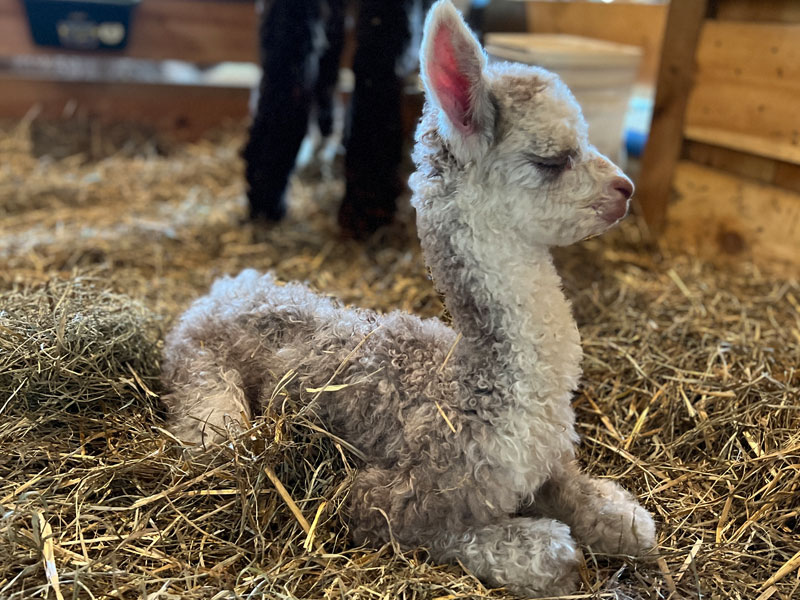
Alpacas Can Preder Having a Human Doula for Birthing
On our farm, I am the human doula for our alpacas. I’ve read every book I can find and I’ve taken a wet lab at Ohio State University so I could learn how to manage a troubled birth. I also work with our pregnant girls to gain trust before delivery so they are comfortable with me being near them and their newborn babies. All of that has paid off and the ladies are calm and welcoming when it’s time to birth. It’s as if they know I’m there to help them and their baby and they welcome it.
I cannot say the same for my son. We’ve been in the middle of a birth and I’ve been adjusting the baby while it is still in mid-delivery when my son arrives. The alpaca momma is perfectly fine with me adjusting a baby that is partially delivered but will scream extremely loud if my son comes anywhere near them. It’s so loud it’s funny.
I have had alpaca mommas touch my cheek in a lovely way as if they are telling me they know I’m there to help. And I’ve had alpaca mommas have a new sense of calm with me after I’ve helped them in a delivery. It’s their way of telling me thank you.
Alpacas are smart, sweet creatures who have an amazing sense of intimacy.
Alpacas Can Know When a Birth is in Trouble and They’ll Wait for a Trusted Human to Help
Alpaca vets always say a female alpaca knows when she is in trouble, and she’ll wait for help. This is so true. I’ve written twice about this on our blog and you can read the birthing stories for Lilly Grace and Ariana to have an illustrated view of this process.
What I find amazing is not only do they wait for help, they know you are helping, and they don’t fight you. Their innate sense of self and preservation for their species seems to overtake their fear. I’ve had to go inside an alpaca to reposition a baby and the sweet momma just looked back at me and patiently waited. Once done she resumed pushing to complete her birth.
Again, I say, nature is cool.
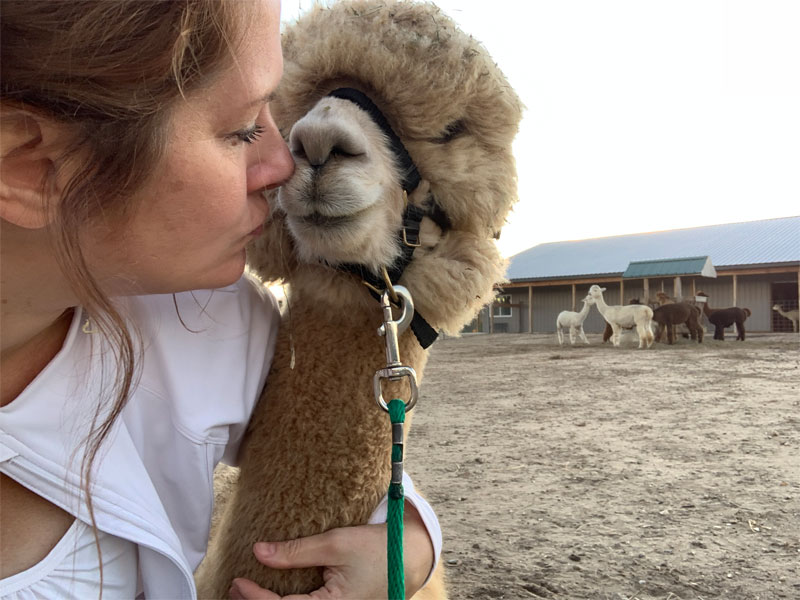
I’ve given you 20 reasons why I love my alpaca herd and why I truly believe these are magical animals. I hope you get a chance to visit an alpaca farm so you can see these fun and quirky animals for all the glorious goodness they offer.

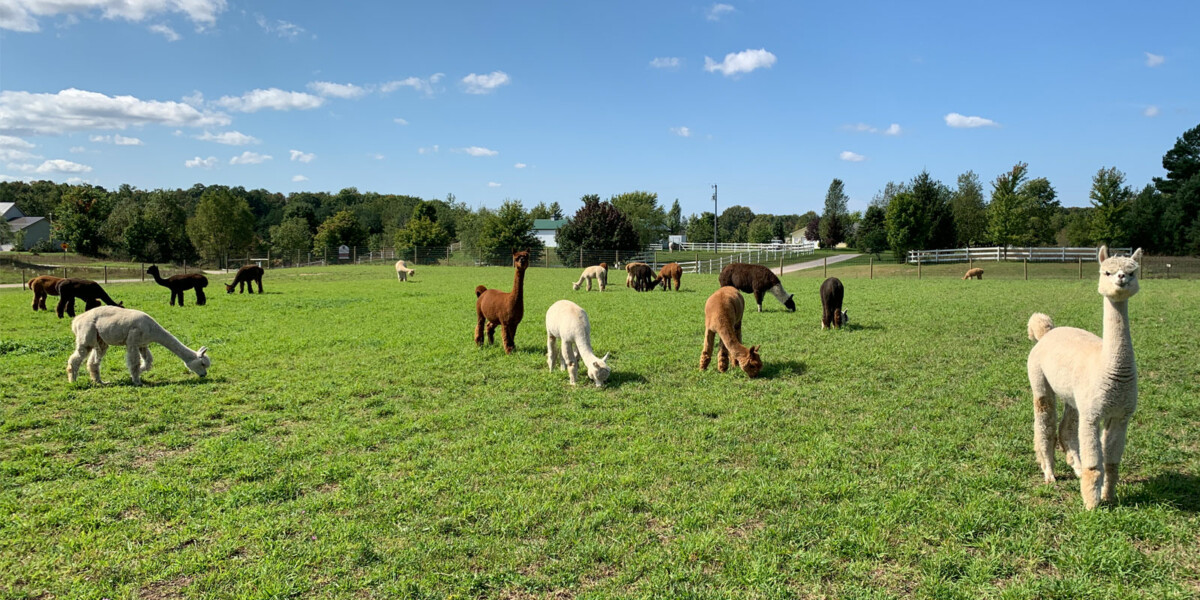
What a fun, interesting piece! We love Cotton Creek & thank you for providing such a wonderful place. 💖
Fully enjoyed the quirkiest animals top 20. I laughed out loud more than once. Looking forward to bringing my grandkids to your farm. We live just south of OSU in Ohio. When I was a little girl, my grandmother brought me an alpaca pillow from Peru. I will likely shop till I drop for my babies and we shall enjoy every minute in the presence of your alpacas. God Bless You. Tammy H. / My grands call me Oma
Thanks for reading and commenting Oma! I am a huge fan of Ohio State University. They are a major source of education and care for alpacas in the midwest. They also saved our alpaca Dolly a few years ago. I cannot imagine breeding and raising alpacas without having OSU available for counsel and care.